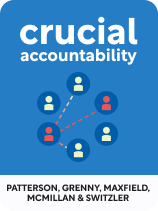

This article is an excerpt from the Shortform book guide to "Crucial Accountability" by Kerry Patterson, Joseph Grenny, et al.. Shortform has the world's best summaries and analyses of books you should be reading.
Like this article? Sign up for a free trial here .
Are you looking for a Crucial Accountability book review? What is the historical and intellectual context of the book?
This Crucial Accountability book review has the answers. Crucial Accountability was published as part of the Crucial Learning series to discuss the importance of accountability conversations and how to effectively manage them.
Keep reading to explore our Crucial Accountability book review.
Crucial Accountability Book Review
This Crucial Accountability book review addresses the concept of accountability conversations. Accountability conversations are the crucial and complicated discussions we have when someone breaks a promise, violates a commitment, behaves badly, or otherwise fails to meet our expectations. If we don’t manage these conversations effectively, our personal and professional relationships can suffer and even collapse. Crucial Accountability was written to address these problems, offering a step-by-step guide that teaches people how to effectively plan, execute, and follow up on accountability discussions so they can maintain healthy relationships and effective organizations.
About the Authors
Kerry Patterson, Joseph Grenny, David Maxfield, Ron McMillan, and Al Switzler are the founders of Crucial Learning, a company dedicated to creating best-selling books and courses focused on improving people’s communication, performance, and leadership skills. For over 30 years, the authors have been working together to help individuals and organizations, and have worked with more than 300 of the Fortune 500 companies. In addition to co-writing Crucial Accountability, the authors also worked together on three other national best-sellers: Crucial Conversations, Change Anything, and Influencer. In 2007, the authors won the Ernst & Young Entrepreneurs of the Year award for their work with Crucial Learning.
Connect with the authors:
The Book’s Publication
Crucial Accountability was published in 2013 by McGraw Hill Education and is the second edition of the original title Crucial Confrontations, first published in 2004. The book is part of Crucial Learning’s two-book series and follows Crucial Conversations, published in 2002. Crucial Conversations, the first book in the series, provides readers with tools and techniques to handle stressful conversations (referred to by the authors as “crucial conversations”). One of the types of crucial conversations addressed in the book is the accountability conversation. Because accountability is so crucial for healthy relationships and effective organizations, the authors chose to go in-depth on this topic in the second book of the series, Crucial Accountability.
Historical and Intellectual Context
While Crucial Accountability followed Crucial Conversations, as well as a few other communication-based self-help books like Emotional Intelligence (1995) and Difficult Conversations (1999), it was revolutionary for its time in that it was one of the first books to put scientific research into an easily accessible, readable, and applicable text. Before 1995, the majority of interpersonal communication research was published in scholarly journals, making it difficult for the average person to access, let alone understand and apply.
The Crucial Learning series was at the forefront of the boom of communication-based self-help books. The book’s predecessors Emotional Intelligence and Difficult Conversations respectively explain that we should learn to control our emotions and detail how to do this in different types of difficult conversations. The Crucial Learning series builds upon these insights by providing new and groundbreaking research—the authors assert that humans tend to handle these situations improperly by default, and the result of this inability can ruin our relationships.
Furthermore, Crucial Conversations adds to the list of hard conversations from Difficult Conversations, goes into more depth on why we mishandle them, and explores what we can do instead. Crucial Accountability goes into the most detail yet, delving into the topic even further by focusing on a specific kind of crucial skill that hasn’t yet been discussed in a self-help book: holding others accountable for their behavioral failures. The authors explain why holding others accountable is vitally important to our relationships and organizations, why people fail to do this, and how we can effectively master the skill. Furthermore, the authors base their claims on years of their own research gathered from observing and interviewing leaders across a wide range of organizations.
While communication-based self-help books were few and far between before Crucial Accountability, the genre took off after the book’s release in 2004.
The Book’s Impact
Crucial Accountability rose to the No. 8 spot on the New York Times Business best-seller list, No. 6 on the Wall Street Journal best-seller list, No. 1 on Amazon’s Business List, No. 1 on 800-CEO-READ, and won “Book of the Year” from Soundview Executive Book Summaries.
The book was one of the first to convey scientific research in terms that were easily understandable and applicable to the general public. Nearly 1 million copies have been sold thus far, and due to the rapid success of the Crucial Learning series, the authors turned both Crucial Conversations and Crucial Accountability into a hands-on learning course offered both virtually and in person with live teachers. The course has been adopted by Fortune 500 companies and individuals alike.
Since the publication of Crucial Accountability, the demand for communication-focused self-help books has boomed. Best-selling books like Creating the Accountable Organization (2006) by Mark Samuel, The Dialectical Behavior Therapy Skills Workbook (2007) by Matthew McKay, Just Listen (2009) by Mark Goulston, Never Split the Difference (2016) by Chris Voss and Tahl Raz, Principles (2017) by Ray Dalio, and many more all built upon the insights of the book.
Critical Reception
The Crucial Accountability book reviews were well received and praised by critical reviewers like The New York Times, Wall Street Journal, numerous Fortune 500 companies, and best-selling authors like Steven Covey of The 7 Habits of Highly Effective People.
Many people writing Crucial Accountability book reviews appreciated the book’s advice on common mistakes people make, why they make these mistakes, how to avoid them, and what to do instead.
On the other hand, a number of Crucial Accountability book reviews critiqued the book’s organization and structure. They noted that although the data was great, it was difficult to follow the arguments because they were masked by too much fluff and story-telling. Furthermore, the book tends to jump from idea to idea rather than completing an argument before moving on to the next one. These comments were a consensus among critics and the general public alike.
Commentary on the Book’s Organization and Approach
The chapter-by-chapter organization of Crucial Accountability is straightforward: Each chapter maps out one of the steps needed to have an effective accountability conversation. As a whole, the chapters are categorized into three parts: what to do before an accountability conversation, what to do during the conversation, and what to do after.
The authors make their arguments by supporting them with primary research and examples. At the start of each chapter, the authors clearly state their argument and then use a story to convey their point. However, their arguments are sometimes buried within chapters, making it difficult to understand what the authors want us to do and when. They tend to meander back and forth from one suggestion to the next while referencing examples, research, and suggestions of what not to do. While this information is all helpful in proving their point and illustrating their suggestions, it distracts from the logical flow of information and makes it difficult at times to pinpoint their advice on what to do.

———End of Preview———
Like what you just read? Read the rest of the world's best book summary and analysis of Kerry Patterson, Joseph Grenny, et al.'s "Crucial Accountability" at Shortform .
Here's what you'll find in our full Crucial Accountability summary :
- How to broach sensitive conversations with loved ones and coworkers
- How to prepare for, execute, and follow up on accountability conversations
- How to solve issues while improving your relationships






